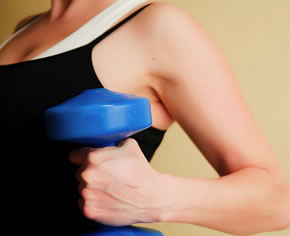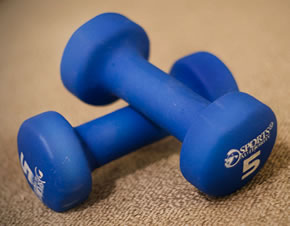
health
Heavy Weights Not Needed for Muscle Growth
 Exciting research from McMaster University in Hamilton, Ontario shows that you do not have to lift very heavy weights to grow large muscles (PLoS ONE. August 10, 2010).
Exciting research from McMaster University in Hamilton, Ontario shows that you do not have to lift very heavy weights to grow large muscles (PLoS ONE. August 10, 2010).
The heaviest weight that you can lift once is called your "One Repetition Maximum" (1RM). This study questions what many non-competitive lifters do. They find their 1RM and do three sets of five repetitions at 90 percent of their 1RM.
In the Ontario study, fifteen men were assigned four sets of leg presses with one leg. They were asked to continue to extend and contract their leg muscles until they were exhausted against 30 percent of their 1RM, and against 90 percent of their 1RM. At 90 percent of their 1RM, they were usually exhausted at five to ten lifts. At 30 percent of their 1RM, they could do about 24 lifts before they were exhausted. So the lighter the weight, the more repetitions they could do. The authors used sophisticated tests for muscle growth (mixed, myofibrillar, and sarcoplasmic protein synthesis) to show that those who lifted more times at a lighter weight have greater immediate muscle growth.
This is just another case of scientists explaining and supporting training methods after athletes have used them to be successful in competition. Richard A. Winett, a professor at  Virginia Tech who has published extensively on strength training, says "the stimulus from resistance training for muscle growth comes from the effort at the end of a set, where the last repetition in good form can be performed. There's no reason to use heavy resistance; moderate resistance, good form with controlled repetitions, and a longer time under tension is effective."
Virginia Tech who has published extensively on strength training, says "the stimulus from resistance training for muscle growth comes from the effort at the end of a set, where the last repetition in good form can be performed. There's no reason to use heavy resistance; moderate resistance, good form with controlled repetitions, and a longer time under tension is effective."
Dr Winett explains that for muscle growth:
- You do not have to use very heavy weights
- You should make an effort to exhaust your muscles (lift towards failure).
- Optimal growth comes from three sets to failure for each muscle and two or three exercises per muscle group.
- You should feel mild soreness on the next day. If you are very sore, you may have used too much resistance, too much volume, too large a range of motion on an exercise, too much emphasis on the eccentric part of the repetition, or you did not get enough sleep for recovery.
Do not lift weights that are so heavy that you lose form and do only partial contractions of your muscles. Try to find a workout that is not painful when you do it, but that makes your muscles feel mildly sore on the next day. As with all exercise, check with your doctor before starting a weight lifting program.
Sports medicine doctor, fitness guru and long-time radio host Gabe Mirkin, M.D., provides news and tips for your healthful lifestyle. Get more information at his website, DrMirkin.com.
© 2006-2013 ConceptDesign, Inc. Terms of Use
BoomSpeak - For babyboomers - by babyboomers.